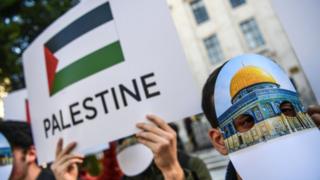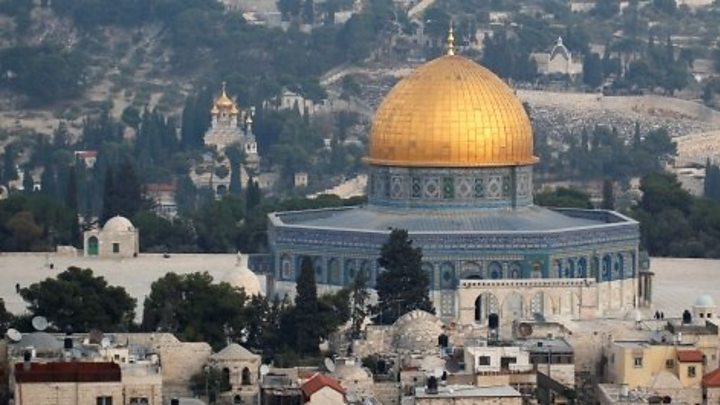 Image copyright
Image copyright
AFP
Pro-Palestinian protesters gathered outside the OIC summit venue in Istanbul
The leaders of 57 Muslim nations have called on the world to recognise “the State of Palestine and East Jerusalem as its occupied capital”.
An Organisation of Islamic Co-operation communique declares US President Donald Trump’s decision to recognise the city as Israel’s capital as “null and void”.
It also says the move has signalled Washington’s withdrawal from its role in the Middle East peace process.
Palestinian President Mahmoud Abbas earlier said the UN should take over.
In a speech to the OIC summit in Istanbul, Mr Abbas said it would be “unacceptable” for the US to be the mediator “since it is biased in favour of Israel”.
The Palestinians had engaged with the Trump administration in an attempt to agree “the deal of the century”, he noted, but had instead “got the slap of the century”.
What is so contentious about Jerusalem’s status?
The status of Jerusalem goes to the heart of Israel’s conflict with the Palestinians.
The city is home to key religious sites sacred to Judaism, Islam and Christianity, especially in East Jerusalem.

Israel occupied the sector, previously occupied by Jordan, in the 1967 Middle East war and regards the entire city as its indivisible capital.
The Palestinians claim East Jerusalem as the capital of a future state, and its final status is meant to be discussed in the latter stages of peace talks.
Israeli sovereignty over Jerusalem has never been recognised internationally, and all countries currently maintain their embassies in Tel Aviv. However, President Trump has announced that the US will eventually move its embassy.
- Trump Jerusalem shift puts counter-terror efforts at risk
- Anger in Ramallah and delight in West Jerusalem
What do the Muslim leaders say?
The communique issued by OIC member states says they reject the unilateral decision by the US to recognise Jerusalem as Israel’s capital as “null and void legally” and consider it an “attack” on the rights of the Palestinian people.
They accuse the US of “deliberately undermining” peace efforts and warn that it has given “impetus to extremism and terrorism”.
They say Washington will be held “fully liable for all the consequences of not retracting from this illegal decision” and that it has effectively announced its “withdrawal from its role as sponsor” of the Israeli-Palestinian peace process.
They then invite all countries to “recognise the State of Palestine and East Jerusalem as its occupied capital” and ask the UN to assume its responsibilities and reaffirm the city’s legal position.
Will it make any difference?
The BBC’s Mark Lowen in Istanbul says that after street protests and widespread condemnation of Mr Trump’s declaration, this was an attempt by Muslim leaders to harden their response.
The meeting was convened by Turkey’s President Recep Tayyip Erdogan, a strident critic of the US move, who vowed to “stand up to American bullying” and called Israel “a state of terror”.
Image copyright
TR
Turkish President Recep Tayyip Erdogan vowed to “stand up to American bullying”
But, our correspondent says, some Muslim leaders are more pro-Trump than others; Saudi Arabia and Egypt only sent ministers to this meeting, possibly to keep the US on board.
So, he adds, there was a semblance of unity at the OIC summit and tough talk, but little sign that Donald Trump was listening.
What do the US and Israel say?
There was no immediate reaction from Washington, but Mr Trump said his declaration was nothing more than “a recognition of reality” and that he was not taking a position on the final status issues of any peace deal.
He also stressed that he intended to “do everything in my power to help forge such an agreement” and that the US “would support a two-state solution if agreed to by both sides” – the short-hand for a settlement that would see the creation of an independent Palestinian state within pre-1967 ceasefire lines in the West Bank, Gaza Strip and East Jerusalem, living peacefully alongside Israel.
Israel’s Prime Minister Benjamin Netanyahu called Mr Trump’s decision “historic” and on Tuesday said that Washington was “irreplaceable” as a mediator.
“There is no substitute to the role that the United States plays in leading the peace process,” he said at a Chanukah candle-lighting ceremony in Jerusalem.
Muslim nations urge recognition of East Jerusalem as Palestinian capital}

